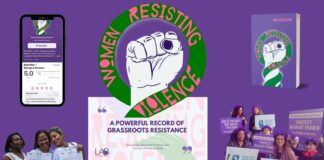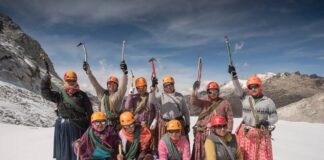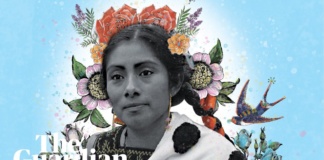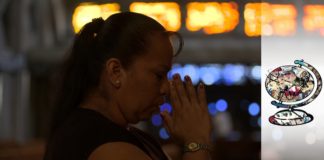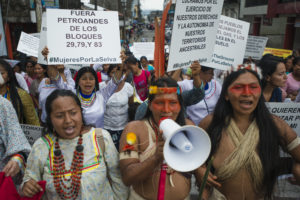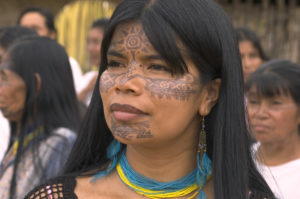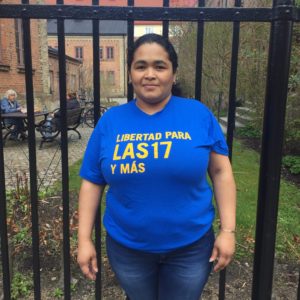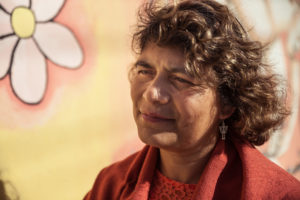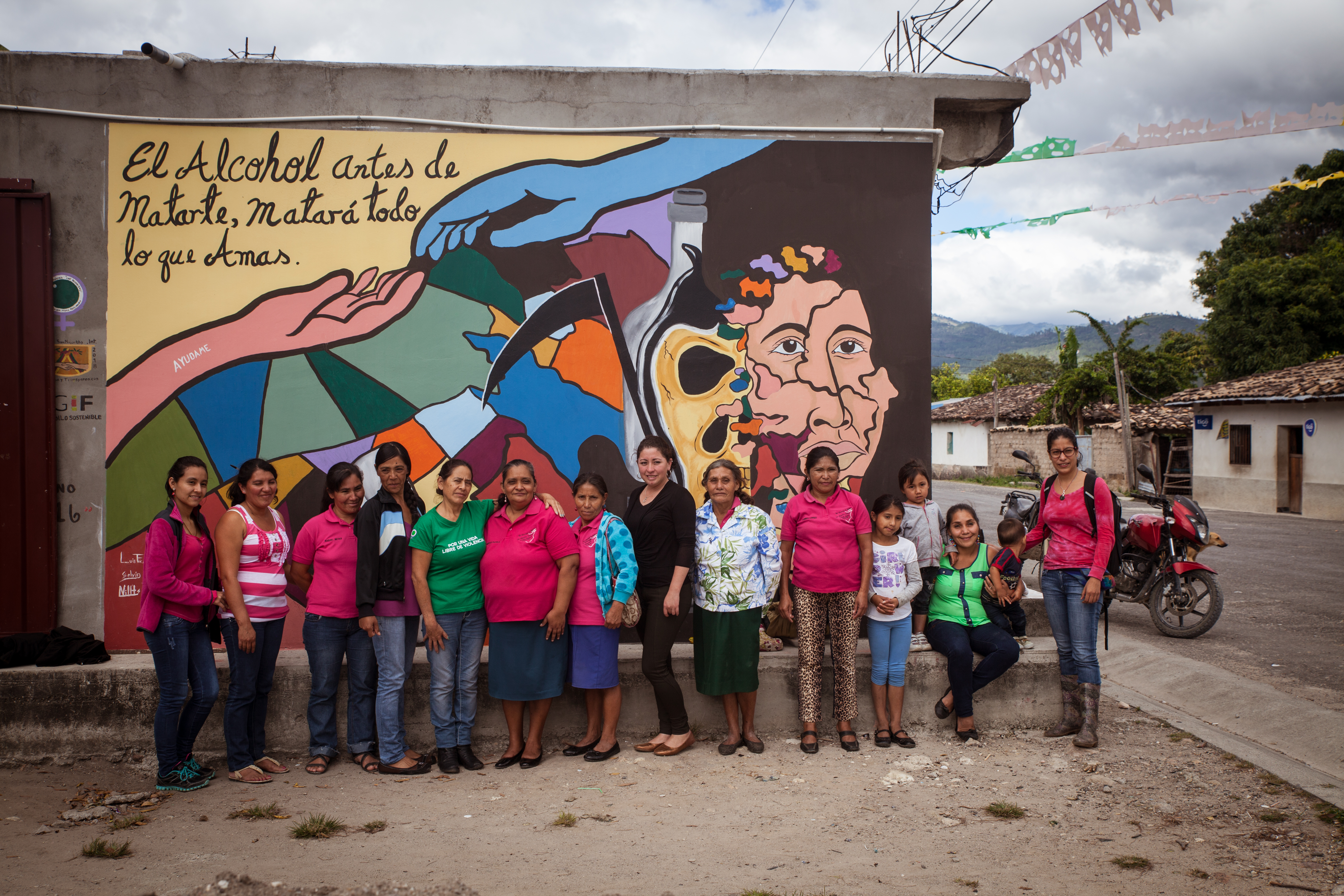
VOLA 2-2
Mural at Las Hormigas, Honduras: ‘Before it kills you, alcohol will kill everything you love.’ ©Pierre Fromentín, 2016.
VOLA 2-3
Some of Las 17 y Más, El Salvador, with their psychologist and one of their lawyers. © Citizens’ Group for the Decriminalization of Abortion 2017
VOLA 2-1
Eva Sánchez, director of the Lenca women’s rights organization Las Hormigas (The Ants), Honduras. © Pierre Fromentín 2016
2. Fighting machismo: women on the front line
Abstract
Women in Latin America have made significant advances in every social and institutional field, being at the forefront of fights for justice. Yet cultural values have not caught up.
Ingrained sexism permeates almost every aspect of daily life, so that women in the region face extreme forms of oppression and inequality.
This is manifest in some of the highest rates of femicide and sexual violence in the world, as well as draconian anti-abortion laws.
Index
News related to this chapter
Reflecting on the Women Resisting Violence project
The Women Resisting Violence project was successful in bringing women together, internationalizing the fight against VAWG, raising awareness of Latin Americans’ campaigns against violence, and reaching a wide audience engaged with social issues.
Honduras legalizes emergency contraception
Following more than 13 years of prohibition and a year of demands by feminist activists, Honduras’ first female president, Xiomara Castro, legalized emergency contraception pills without exceptions
Cholitas: Aymara women conquer the Aconcagua
In this captivating documentary film, Spanish directors Jaime Murciego and Pablo Iraburu present the story of five Bolivian Aymara women as they pursue their dream of climbing the highest mountain in the Americas, the Aconcagua.
International Women’s Day 2023 in Mexico
Gender-based violence continues to be an issue of great urgency in Mexico. Hundreds of thousands of women marched in Mexico City on March 8. Yet, migrant women are excluded from the mainstream movement in Mexico.
Peru: Women in film
Karoline Pelikan sketches out the current landscape for women in film in Peru, and interviews three women from the board of directors at NUNA, the country's first association of women directors.
Videos
Lupita: justice for Acteal
Scarred by a brutal massacre which took place in December of 1997 and left 45 dead, the residents of Acteal, in the highlands of Chiapas, continue to remind the world never to forget. One woman is at the forefront.
Chile: La caravana de las Danzas
The 2018 Caravana de las Danzas 2018, dancing in La Plaza de Talca and taking a walk around the Barrio en Colores, an open...
Chocolate Remix: Lo que las mujeres quieren
Lesbian Reggaeton: 'Lo que las mujeres quieren' (What girls want). With English subtitles.
Chocolate Remix is the reggaetón project led by Romina Bernardo (aka Chocolate)...
El Salvador: the world’s worst place to have an abortion
Ben Zand investigates the controversial case of Evelyn Hernandez, a Salvadoran teenager raped by a gang member and then jailed for 30 years...
El Salvador: from miscarriage to murder
Abortion law in El Salvador recognises no distinction between intentional abortion and unintentional miscarriage, applying jail sentences to both. SBS Dateline investigates...
About the Author
Interviewees
Alicia Cawiya (vice president of the Huaorani people): interviewed in Quito and Puyo, Ecuador, on 16 and 20 August 2016 by Linda Etchart and James Thackara. Translated by Linda Etchart.
Patricia Gualinga (Sarayaku Kichwa activist): interviewed in Puyo, Ecuador, on 24 August 2016 by Linda Etchart and James Thackara. Translated by Linda Etchart.
María Teresa Rivera (Salvadorean reproductive rights activist): interviewed via Facebook Messenger on 15 January 2018 by Louise Morris. Translated by Matthew Kingston.
Eva Sánchez (Las Hormigas): interviewed in Intibucá, Honduras, on 26 October 2016 by Louise Morris. Translated by Louise Morris.
References
NB: All web references were checked and still available in May/June 2018 unless otherwise stated.
BBC News (2017) ‘Honduras on “red alert” over female murders, say activists’, 6 July
Belli, G. (2016) ‘Why has “macho” Latin America elected more female leaders than the US?’, The Guardian, 7 November
Bott, S., Guedes, A., Goodwin, M. and Mendoza, J.A. (2012) Violence Against Women in Latin America and the Caribbean: A Comparative Analysis of Population-Based Data from 12 Countries, Pan American Health Organization,Washington DC
Clavel, T. (2018) ‘Why Latin America dominates global homicide rankings’, InSight Crime, 12 March
Driver, A. (2017) ‘What women’s lives are like when abortion is a crime’, CNN, 5 October
Goudreau, J. (2011) ‘The Ten Worst Stereotypes About Powerful Women’, Forbes, 24 October
Lakhani, N. (2017) ‘El Salvador teen rape victim sentenced to 30 years in prison after stillbirth’, The Guardian, 6 July
Phillips, T. (2018) ‘“Breathtaking homicidal violence”: Latin America in grip of murder crisis’, The Guardian, 26 April
Sherwell, P. (2015) ‘El Salvador’s Las 17: the women jailed for 30 years for losing their babies by miscarriage’, The Telegraph, 16 February
Tello Rozas, P. and Floru, C. (2017) ‘Women’s political participation in Latin America: some progress and many challenges’, Institute for Democracy and Electoral Assistance (IDEA), 7 March
VOA (2017) ‘OAS chief: violence against Latin America’s women a “never-ending story”’, 7 November
Waiselfisz, J.J. (2015) Mapa da violência 2015: homicídio de mulheres no Brasil, FLACSO, Brasília
WHO (2012) ‘Understanding and addressing violence against women’, World Health Organization
Yagoub, M. (2017) ‘How violence against women fuels more crime’, InSight Crime, 8 March
Further Reading
General
- Collyns, D. (2016) ‘Women vow to fight on in Peru after Alberto Fujimori absolved over forced sterilisations’, The Guardian
- Hernandez, V. (2012) ‘Argentine Mothers mark 35 years marching for justice’, BBC News
- Lizarzaburu, J. (2015) ‘Forced sterilisation haunts Peruvian women decades on’, BBC News
- López Levy, M. (2018) ‘#NiUnaMenos: ‘Now that you see us’, Latin America Bureau
- Palmer, R. (2017) ‘Ni Una Menos: An Uprising of Women in Argentina’, Culture Trip
- Waisman, V. (2018) ‘An alternative obituary for Efraín Ríos Montt’, Women’s Media Center
Femicide
- McSheffrey, E. (2018) ‘Honduran women pay for rights with their lives’, Canada’s National Observer
Honduran coup and its effect on women
- Lakhani, N. (2016) ‘Did Hillary Clinton stand by as Honduras coup ushered in era of violence?’, The Guardian
- Zunes, Stephen. (2016) ‘The U.S. Role In The Honduras Coup And Subsequent Violence’, The Huffington Post
Eva Sánchez/Las Hormigas
- Radio Progreso (2016) ‘Las Hormigas: Constructoras de una Vida sin Violencia’, Radio Progreso (in Spanish)
- Redacción Criterio (2018) ‘Las Hormigas avanzan en lucha por posicionar agenda de mujeres en planes de gobiernos locales’, Criterio, (in Spanish)
Reproductive rights in El Salvador
- Kowalchuk, L. (2018) ‘The unspeakable cruelty of El Salvador’s abortion laws’, The Conversation
- Oberman, M. (2018) ‘The Consequences of El Salvador’s Abortion Ban’, Guernica

